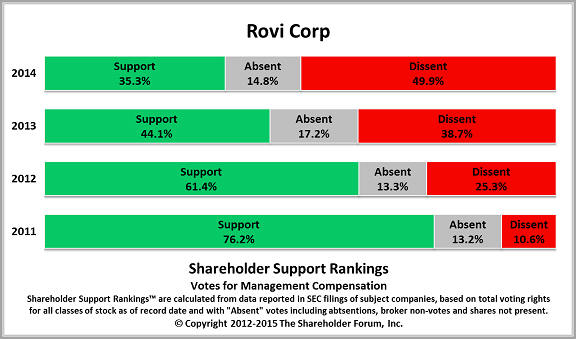|
At Rovi, Activist Investor's Years of Protests Against Executive Pay
May Give Leverage on Board
By
Ronald Orol
|
03/30/15 - 09:49 AM EDT
NEW YORK (The
Deal) -- Three years of protest votes by shareholders against
Rovi's (ROVI)
executive pay packages mean activist investor
Glenn Welling picked a relatively soft target for his short-slate
proxy fight at the digital entertainment technology provider.
Welling's Engaged Capital is seeking to
install three directors, including himself, on the Santa Clara,
Calif.-based company's board at an annual meeting set for May 13. In a
letter to Rovi's directors, Welling argues that shareholder returns
have been negative overall since the company was formed by the
combination of Macrovision and Gemstar-TV Guide International in May
2008. He also raised concerns about the "long tenured" board -- five
independent directors have been around since the merger while most
have had much longer tenures -- and that new cost management and
return on investment expertise is needed.
The company operates an interactive TV-guide technology for multiple
devices, an intellectual property licensing operation and an analytics
business.
In a small way,
Welling's campaign has already succeeded -- last Monday, Rovi
expanded its board to seven members and added a little new blood in
the form of a new director,
Steven Lucas, an analytics and technology expert.
Will that be enough to appease the company's investor base? Not
likely.
A review of non-binding shareholder votes on the company's executive
pay packages, including compensation paid to
Rovi CEO Tom Carson over the past three years suggests that there
may be a number of disgruntled investors who could back Welling in his
campaign.
In 2012, only about 70% of voting shares backed the
top executive pay packages at Rovi, already a substantial vote of
no-confidence. In 2013 Rovi received the backing of just 53% of voting
shares. Finally, last year Carson and other executives received the
backing of merely 40%, suggesting that a substantial majority of
shares have significant concerns about pay and the performance of the
company.
In both 2013 and 2014, proxy advisory firm
Institutional Shareholder Services recommended shareholders vote
against the Rovi executive pay plans. The substantial negative vote in
2014 was partly focused on Carson's 2013 compensation of $5.8 million,
including roughly $4.7 million in equity grants. The 2013 vote was
also likely a reaction to Carson's "new hire" pay of $9.98 million in
2012, which included an $8.9 million equity grant. According to the
2015 proxy statement, Carson was paid $6.7 million in 2014, including
roughly $5.5 million in equity grants.
Semler Brossy Consulting, an executive compensation firm, in a May
2014 report attributed the sizable no vote that year to the level of
Rovi's pay package compared to peers, the company's negative
three-year total shareholder return -- which includes stock price and
dividends -- and a reduction in short-term incentive goals in fiscal
2013 compared to fiscal 2012. A recent ISS Quickscore report, obtained
by The Deal, gives Rovi its lowest score for compensation, 10
out of 10, suggesting that the company still has executive pay issues.
Nevertheless, Rovi has made a number of pay-related improvements,
according to its March 23 preliminary proxy statement. It adopted a
clawback policy, which authorizes the board to recover
compensation paid to executives based on results that were
subsequently restated or corrected. It also changed its pay package
peer group of corporations.
© 1996-2015 TheStreet,
Inc. |
